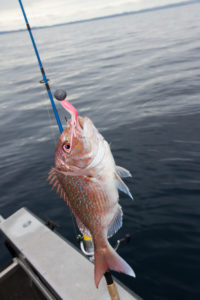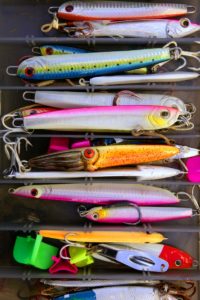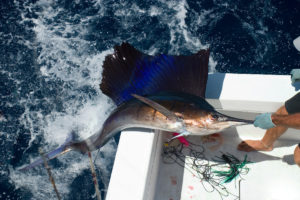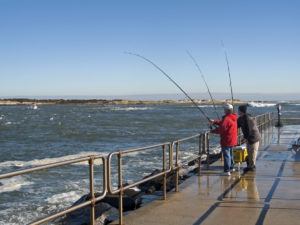Saltwater fishing is a thrilling and rewarding experience for anglers of all skill levels. From targeting species such as redfish and speckled trout in shallow waters to going after the big game offshore species like marlin and tuna, there is something for everyone in the world of saltwater fishing.
However, this type of fishing requires a different approach and set of skills compared to freshwater fishing. Here are just a few salt water fishing tips:
- Choose the right gear for saltwater fishing, including a strong fishing rod, reel, and fishing line that can handle the corrosive saltwater environment.
- Look for fishing spots that have structure, such as reefs, drop-offs, and channels, as these areas attract a variety of fish species.
Learning how to saltwater fish can be a challenging but rewarding experience. By following these tips and techniques, you can improve your chances of success and make the most of your time on the water.
Remember, the most important thing is to have fun and enjoy the adventure!
If you’re curious about the ins and outs of saltwater fishing and want to learn about the gear, techniques, and species that make it such a thrilling pastime, be sure to check out our latest blog post that explains “What is Saltwater Fishing?” – it’s a must-read for anglers of all levels!
In this blog post, we will be sharing some expert saltwater fishing tips from Jacob James, a seasoned seafood industry expert and avid fisherman, to help you make the most out of your next saltwater fishing trip.

Know What the Tide Is Doing
The tide is one of the most important factors in saltwater fishing. It affects the behavior of the fish and their prey, so understanding the tide is crucial.
Fish are more active during tidal movement, so aim to fish on days when there is water moving all day. On days with no tide, the fishing is likely to be poor.
The best way to check the tide report in your local area is to use a reliable online source, such as the National Oceanic and Atmospheric Administration (NOAA) website or a local fishing report website.
You can also download a tide prediction app on your smartphone for convenience.
5 Popular Tide Prediction Apps
Some popular tide prediction apps that you can use to check the tide report in your local area include:
- Tides Near Me
- My Tide Times
- Tide Chart
- FishWeather
- NOAA Tides & Currents
These apps provide real-time and accurate information on the tides, as well as other helpful features such as weather forecasts and fishing tips.
Become Scentless
Redfish and other species of fish have a keen sense of smell, so it’s important to be scentless.
Carry a bottle of lava soap with you to get rid of any gas or sunscreen smells.
You don’t want those scents getting on your lures and putting the fish off.
5 Natural Ways to Remove Scent
Some natural ways to remove scent from your hands include:
- Lemon or lime juice: Rubbing your hands with fresh lemon or lime juice can help neutralize strong odors.
- Baking soda: Mix a small amount of baking soda with water to make a paste, then rub it onto your hands and rinse with warm water.
- Vinegar: Soaking your hands in a mixture of vinegar and water for a few minutes can help eliminate strong smells.
- Coffee grounds: Rubbing coffee grounds onto your hands can help absorb strong odors.
- Salt and lemon: Mix salt with lemon juice and rub the mixture onto your hands, then rinse with warm water.

Stay Away from Junk Fish
If you’re fishing in the middle of the summer, avoid high-profile areas like shipwrecks and large reefs. These areas are often home to sharks and barracudas, which can be a nuisance.
Instead, head to low profile areas like live reefs and rock bottoms. Grass beds are also a good choice.
5 Tips to Avoid Junk Fish when Salt Water Fishing
Here are some ways to avoid catching junk fish when saltwater fishing:
- Use the right bait: Certain baits, such as squid, shrimp, and cut bait, are more likely to attract desirable game fish and less likely to attract junk fish.
- Change your location: Move to a different area or depth where the target fish are more likely to be found.
- Use different gear: Adjusting your gear, such as using a smaller hook or changing the weight of your lure, can help you target specific fish species and avoid junk fish.
- Time of day: Fishing during certain times of the day or night can increase your chances of catching desirable game fish.
- Use a fish finder: A fish finder can help you locate schools of fish and identify the species before you drop your line, reducing the chances of catching junk fish.
Change Fluorocarbon After a Fight
After you catch a fish on a fluorocarbon leader, the line becomes stressed and its chemical properties change.
This makes it visible to fish again, reducing your chances of catching another.
Whenever you catch a decent-sized fish, change your line to increase your chances of success.
If you’re looking for a strong and versatile fishing line for saltwater fishing, I highly recommend the Berkley Vanish Fluorocarbon Fishing Line/Leader Material.
It’s virtually invisible underwater and perfect for catching big fish like tuna and marlin. Give it a try and see for yourself!

Pick the Right Lure Depending on Depth
Fish have their best vision at the surface, so use colorful lures near the top of the water. As you go deeper, the color spectrum narrows,
so switch to whites and darker lures that contrast with the bottom. This will help you attract bottom fish and improve your chances of success.
5 Tips to Select the Right Lure for Salt Walter Fishing
- Consider the species of fish you’re targeting – Different fish species are attracted to different types of lures. For example, if you’re targeting redfish, a spoon lure or soft plastic shrimp bait may be a good choice.
- Look at the water conditions – The clarity and depth of the water can affect the effectiveness of certain lures. If the water is murky or shallow, a bright-colored lure or topwater bait may work best.
- Match the size of the lure to the size of the baitfish – If you’re trying to mimic the natural baitfish in the area, make sure your lure is similar in size and color.
- Experiment with different types of lures – Don’t be afraid to try different lures to see what works best. Some days, a crankbait may work better than a jig.
- Pay attention to the weather and time of day – Certain lures may work better depending on the weather conditions and time of day. For example, a slow-moving lure may work better in cooler temperatures or during low light conditions.

Keeping Your Live Bait Alive: Tips and Tricks
Live bait can be a highly effective way to attract saltwater fish and increase your chances of a successful catch.
However, keeping your live bait alive and healthy can be a challenge, especially when you’re out on the water for an extended period of time.
4 Tips to Keep your Live Bait Alive
To ensure your live bait stays alive and active, here are some tips and tricks to keep in mind:
- Use a high-quality bait well or livewell: A properly functioning bait well or livewell is essential for keeping your bait alive. Make sure to regularly check and clean the water to prevent any buildup of waste or bacteria.
- Keep the water temperature consistent: Saltwater fish are highly sensitive to changes in water temperature, so it’s important to keep the water in your bait well at a consistent temperature. If the water gets too warm, add ice or use a recirculating pump to keep the water cool.
- Avoid overcrowding: Overcrowding your bait well can lead to stress and suffocation of your live bait. Make sure to give your bait enough space to move around freely and provide plenty of aeration to keep the water oxygenated.
- Handle your bait gently: Rough handling can injure or kill your live bait. When transferring your bait to your fishing rig or bait well, make sure to handle them gently to avoid any unnecessary stress or injury.
By following these tips and tricks, you’ll be able to keep your live bait alive and active, and increase your chances of a successful saltwater fishing trip.

Seek Local Advice for Saltwater Fishing Success
When it comes to saltwater fishing, one of the best things you can do to improve your chances of a successful catch is to seek advice from local fishermen and bait shop owners.
They have a wealth of knowledge about the area, including where the fish are biting, what types of bait and lures work best, and even what the weather conditions are like.

Many times, they are happy to share their expertise and give you tips on how to improve your fishing game.
*Pro Tip: You can also find helpful advice by joining Facebook groups that focus on fishing in the area you are visiting.
These groups are a great resource for connecting with other fishermen, sharing tips and tricks, and even finding fishing buddies.
By seeking advice from local experts and connecting with other fishermen, you can greatly improve your chances of having a successful saltwater fishing trip.
Go Saltwater Fishing
While these tips and tricks can help improve your saltwater fishing game, the best thing you can do is to simply get out on the water and try different techniques and lures until you find what works best for you.
Remember, a bad day of fishing is still better than a good day at work, and the joy of catching and cooking your own fresh fish is hard to beat.
Fried fish is undeniably one of the most delicious ways to enjoy seafood, and if you’re looking to perfect your frying technique and take your culinary skills to the next level, be sure to check out the comprehensive guide on how to fry fish!

So grab your friends and family, hit the water, and enjoy the beauty and excitement of saltwater fishing!
Saltwater fishing is an exciting and enjoyable activity, but it takes skill and practice.
Always prioritize safety when fishing and choose the right gear and equipment. Learn how to pick a good fishing spot and try different tactics and baits to attract fish.
Keep your catch fresh by putting it on ice right away and do your research before going on a fishing trip.
These tips will help you become a more successful and happy angler. Finally, if you want to learn a challenging but effective knot, the Bimini Twist is worth mastering.
